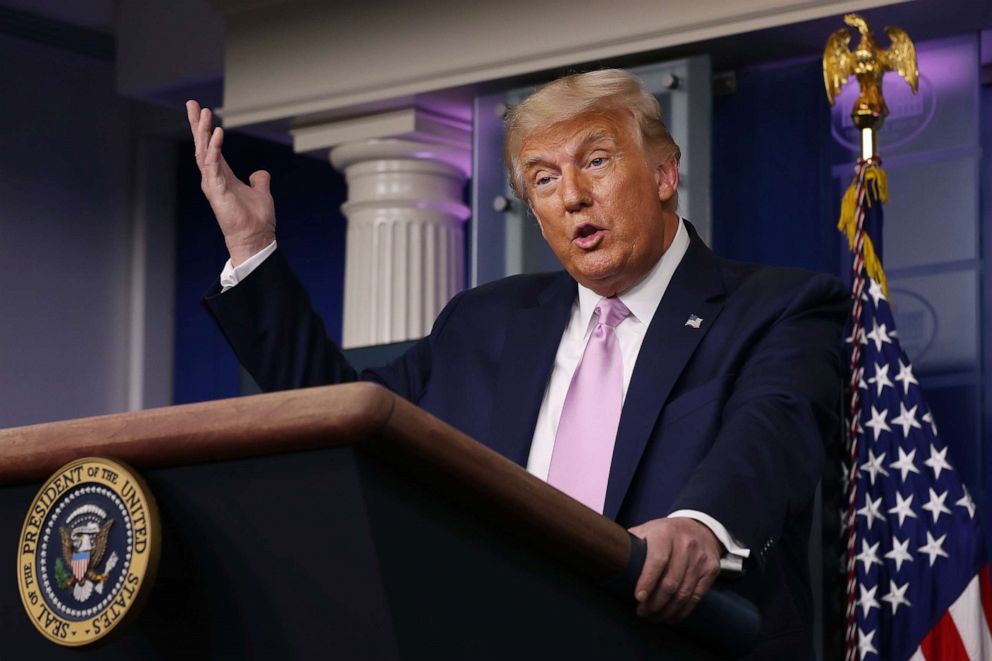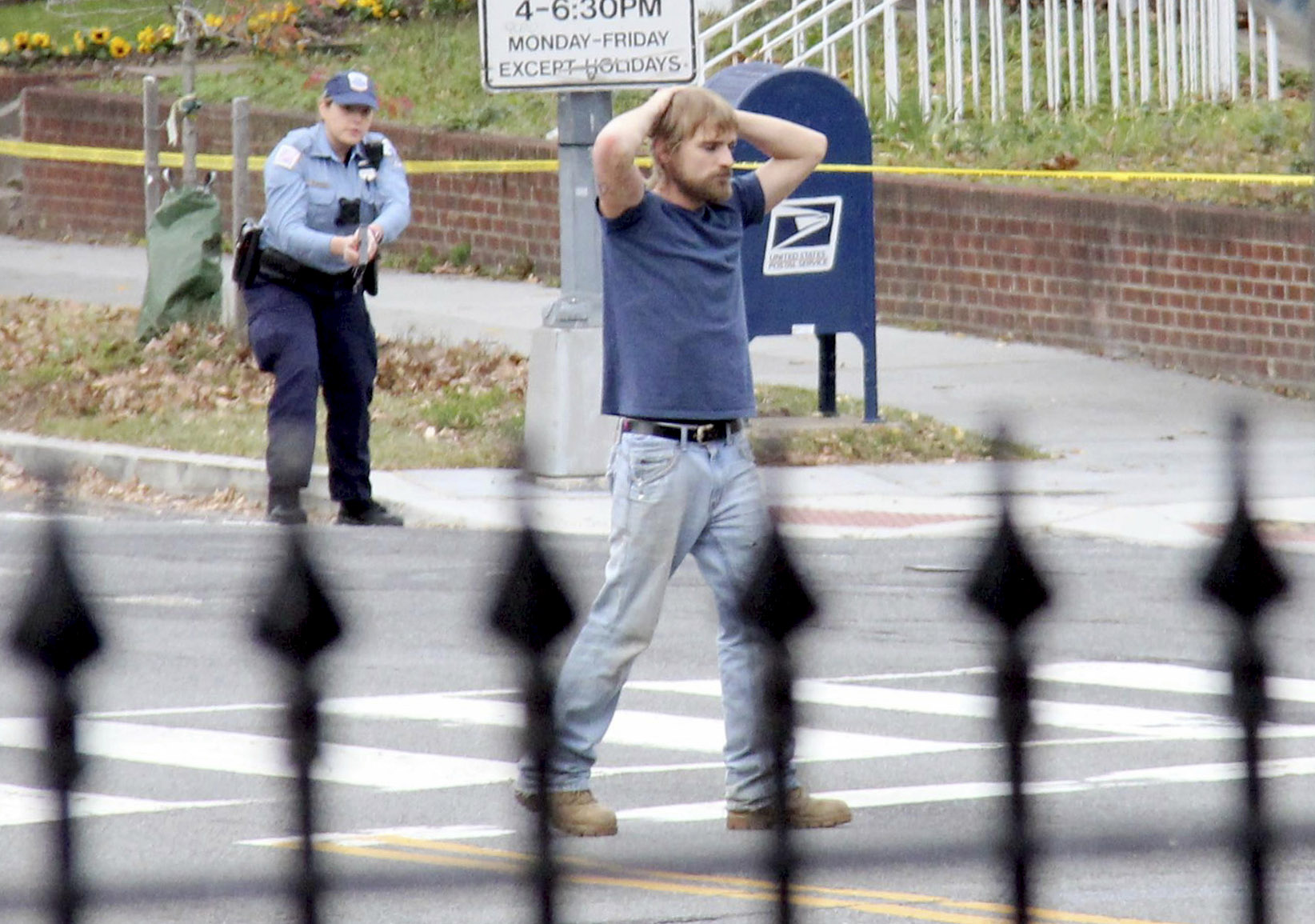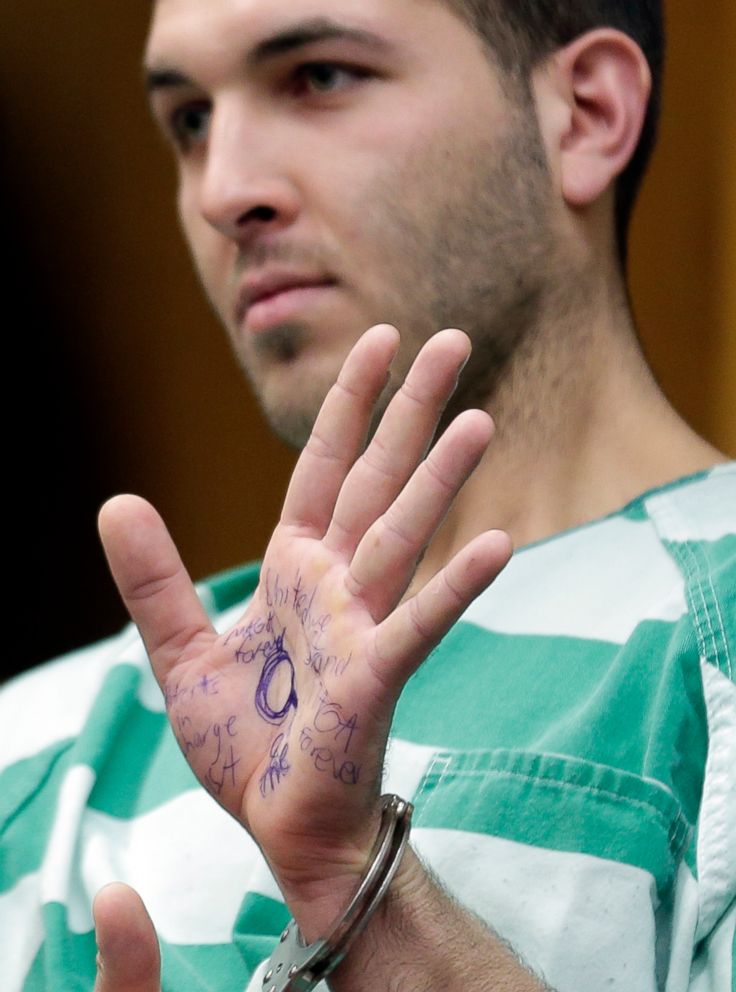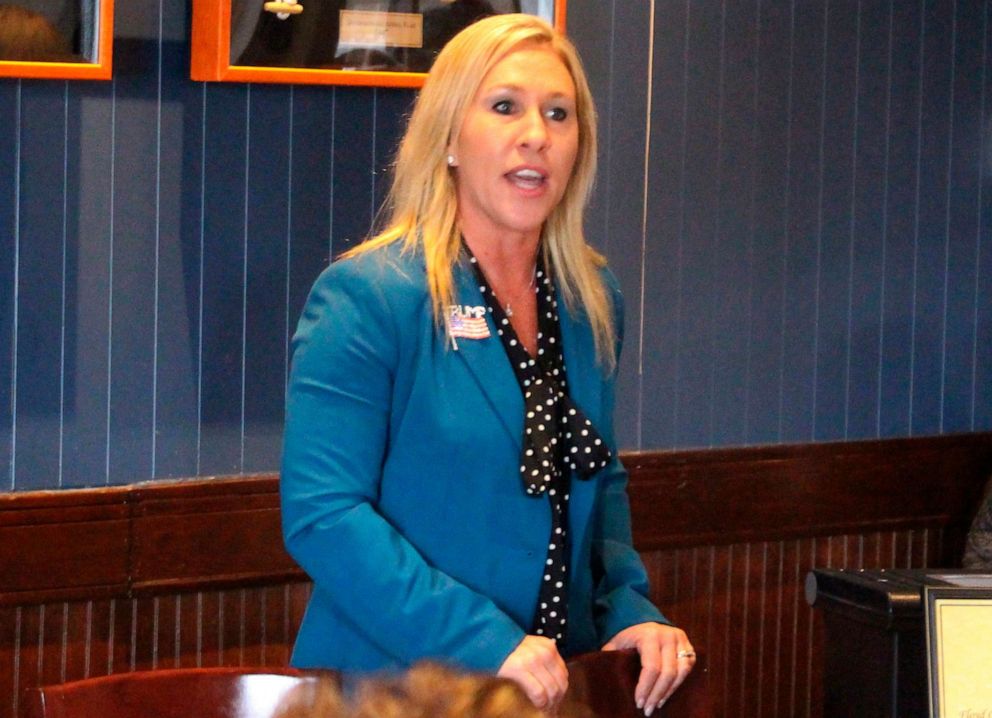QAnon, once a fringe conspiracy theory, edges into the mainstream: 'Things could get much, much worse'
QAnon began in the internet's darkest corners. Now it's set to enter Congress.
It was a statement that shocked almost everyone watching. For a few, it was a moment a long time coming.
When pressed about a baseless conspiracy theory that he is leading the charge against a global Satanic pedophilic and cannibalistic syndicate, the president of the United States appeared to approve.
"If I can help save the world from problems, I'm willing to do it," President Donald Trump said during a White House press conference in August.
Trump said that he knew little of the ascending fringe movement known as QAnon.
But for the multiplying number of QAnon supporters, that apparent nod from the catalytic figure of their worldview was the culminating event of three years of online theorizing, prophesying and posting.
QAnon had arrived in the mainstream, exactly where its acolytes always believed it belonged.
The next destination for the movement -- one blamed for numerous acts of violence and deemed a potential domestic terror threat by the FBI -- could be the halls of Congress.

'Regardless of how deranged it sounds'
"The broad narrative of QAnon is that the world is controlled by a Satanic cabal of Satan-worshiping pedophiles," Travis View, co-host of the podcast "QAnon Anonymous," told "Nightline."
"And this cabal, they control everything," said View, who has tracked the movement since it emerged from the labyrinths of 4Chan in 2017. "This includes the media and entertainment and politicians. QAnon followers believe that this cabal would've continued ruling the world indefinitely were it not for the election of Donald Trump."
The amorphous belief system has generated a wide spectrum of fictional and ludicrous beliefs based on deciphering cryptic messages believed, without any evidence, to be released online by a figure -- or figures -- claiming high-level clearance within the Trump administration.
Any number of Democratic Party leaders and celebrities, from Hillary Clinton to Chrissy Teigen, have been imagined at the center of expansively sinister plots.
Major events, from the 2017 Las Vegas shooting to the Mueller investigation to the coronavirus pandemic, have been assimilated into the increasingly sprawling theory -- often, as soon as they occur.
Elements of anti-vaccination beliefs, COVID-19 misinformation, anti-Semitic tropes and more have also been recruited into the roster of beliefs, inflating QAnon into a catch-all of conspiracy theories.
“Q kind of encourages followers to basically believe whatever sounds most appealing to them, regardless of how deranged it sounds,” View told ABC News. “As a consequence, they run off in these wild directions.”
‘We think humanity is literally at stake’
QAnon first came to national attention two years ago, when a group of attendees appeared prominently in “Q” t-shirts at a Trump rally in Tampa, Florida.
But the movement had already been festering in the caverns of the internet for some time.
QAnon metastasized out of "Pizzagate," a false conspiracy theory that circulated during the 2016 election, which held that prominent Democratic Party figures were running a child sex trafficking ring out of a Washington, D.C.-area pizza parlor.
The wildly baseless reports eventually led Edgar Maddison Welch to discharge an AR-15 assault rifle inside the restaurant, believing he was investigating the nonexistent trafficking operation hidden within.
Welch was sentenced in 2017 to 48 months in prison and "Pizzagate" dissipated after the incident.

Then, in October 2017, an enigmatic post appeared on the chatroom 4Chan claiming to be from a member of the Trump administration with 'Q'-level clearance that anticipated, wrongly, the impending arrest of Hillary Clinton.
Q clearance is an actual level within the U.S. Department of Energy, though that’s where the link to reality ends.
Hundreds more "Q-drops" ensued as the theory incorporated the central suspicions, if not the specifics, of "Pizzagate." Followers became convinced that a global pedophile ring was running in plain sight, and were assured that mass arrests of prominent Democrats and movie stars was imminent -- prophecies that were routinely shown to be bogus.
"QAnon followers believe that Q's posts are coded information from high-level military intelligence officials close to President Trump," View said.
"So they've developed a lot of excuses as to why Q's predictions always fail," he explained. "They say, for example, misinformation is necessary or disinformation is necessary. This idea is that sometimes whenever Q gets something wrong, there is a legitimate reason they think that Q is trying to trick this global cabal that they believe that Trump and the Q Team is fighting against."
Two QAnon devotees who spoke to "Nightline" in 2018 about their involvement remain staunch advocates today, despite the grandiose predictions' failures.
“If you believe like we do, we think humanity is literally at stake here,” Melissa Dietrich, of Reading, Pennsylvania, recently told ABC News. “It's not just about our country. It's about, again, this global power structure that's been in place forever.”
View said that the rapid intensification of some QAnon supporters' beliefs distinguishes them from people who may passively believe in other conspiracy theories, such as the existence of aliens at Area 51.
"They're being radicalized, in the sense that it becomes a major part of their life," View said. "They spend so many hours, every day, obsessing over it. And it starts to detract from other areas of their life, like their family or their career."
It's a radicalization that could trigger offline violence, according to Eric Jackson, a former FBI agent who specialized in terrorism.
"If you look at their actions from the time of them expressing their feelings to the time of their action, it can be a very short period," he said.
'Things could get much, much worse'
In 2018, Matthew Wright blocked a highway atop the Hoover Dam and demanded the release of a report from the Office of the Inspector General, a common QAnon battle cry at the time.
Armed with a small arsenal, Wright led state troopers on an extended chase before he was apprehended. He pleaded guilty earlier this year to multiple charges, including making a terroristic threat.
This real-world act of violence perpetrated in connection with QAnon was one of several cited by the FBI in a 2019 bulletin saying the group was a potential domestic terror threat.
It wouldn't be the last time QAnon was tied to mayhem.
In 2019, purported Gambino family boss Francesco "Franky Boy" Cali was gunned down at his Staten Island, New York, home in what initially appeared to be the beginnings of a mob war. Then, the story took a bizarre, QAnon-related twist.
According to court documents, murder suspect Anthony Comello was a QAnon follower who thought he was striking against the “Deep State,” with the protection of the president.
During an extradition hearing in March 2019, Comello displayed ink scribblings on his hand, including a large "Q" in the middle of his palm.

Commello, who is awaiting trial, pleaded not guilty by reason of insanity.
Some QAnon followers have recently begun targeting Child Protective Services and the foster care system, believing the agencies to be a "front" for child trafficking operations.
At least three parents who are allegedly QAnon supporters are facing charges for attempting to take their children from their legal guardians.
One of those parents, Alpalus Slyman, gathered his five children into his car after allegedly throwing their mother from the vehicle, believing her to be involved in child sex trafficking. He livestreamed the ensuing police chase on Facebook.
"If you truly believe that they are truly doing these Satanic evil things in pools, underground, and raping babies, and Pizzagate ... all of this is real … that’s not a conspiracy theory," Slyman said on Facebook. "Because once the facts are out -- that's not just a theory -- that’s a fact."
When Slyman's daughter tried to commandeer the wheel from him, he appealed to Trump and QAnon, shouting, "Donald Trump, I need a miracle or something. Somebody, QAnon, help me."
"It's a movement that has inspired some of its followers to commit really egregious criminal actions, including acts of terrorism, kidnapping and vehicular assault," said Jared Holt of Right Wing Watch, which monitors extremist groups.
"So Trump's statements about QAnon, speaking favorably of them, I fear, as having watched this for so long, is incredibly dangerous," Holt warned. "This is something that I believe should be nipped in the bud as fast as possible and condemned. Otherwise things could get much, much worse from here."
"Their ideology and their rhetoric are becoming more violent," said Jackson, who feared QAnon may be inspiring lone wolf terrorists to commit attacks.
"Where QAnon may be a foundation for those types of individuals … they're operating beneath the radar," he said. "They're using social media to gather their ideology."
'The potential to lead to offline harm'
Social media companies have -- belatedly -- begun taking action.
Twitter cracked down in July on accounts and hashtags related to QAnon, citing an uptick in terms of service violations by supporters, especially concerning "behavior that has the potential to lead to offline harm." TikTok took similar action less than one week later.
Facebook, a nexus for QAnon supporters, followed suit in August, removing nearly 1,000 pages and significantly curtailing the reach of thousands of pages, groups and Instagram accounts.
Facebook characterized the effort as part of an expansion of its "Dangerous Individuals and Organizations policy" to cover "organizations and movements that have demonstrated significant risks to public safety but do not meet the rigorous criteria to be designated as a dangerous organization."

All three companies significantly lagged behind Reddit, which deplatformed QAnon in fall of 2018. Many worry these recent moves are too little, too late.
Researcher Marc-André Argentino, a PhD candidate at Concordia University focused on technology and extremist groups, told ABC News last month that QAnon-associated Facebook pages and groups exploded this year, boasting a 651% increase since March as groups allied with the conspiracy theory jumped from just over 200,000 members to 1.7 million.
Despite the platforms' crackdown, followers were recently able to infiltrate #SavetheChildren, a non-QAnon related hashtag, according to NBC News, raising concerns that social media users could be interacting with QAnon content without realizing it.
'Q is the information'
Having vaulted from the depths of 4Chan to the heights of the White House briefing room, QAnon now looks poised to enter the machinery of U.S. politics.
Nineteen QAnon-supporting congressional candidates are on the ballot this year, according to a tally from the left-leaning research group Media Matters.
And while few are favored to prevail in their general elections, at least two candidates tied to the theory have a strong chance of being sworn in next January.
The likeliest is Marjorie Taylor Greene, who recently won the runoff for the Republican primary in Georgia’s 14th congressional district, despite a history of praising QAnon and other conspiracy theories and her espousal of a litany of racist, anti-Semitic and Islamaphobic views.

In a video originally posted to Facebook and later reposted to YouTube, Greene called the poster behind the "Q-drops" a "patriot," and claimed "he's on the same page as us and he is very pro-Trump."
"Now, he appears to have connections at the highest level," she continued. "It's not just someone poking in the dark, messing with people. He seems to be very high up. He seems to be very close to President Trump."
Fellow Republicans distanced themselves from Greene during the runoff. But following her victory, Greene earned an endorsement from President Trump, who tweeted that she was a "future Republican Star ... a real WINNER!"
Pressed at a subsequent briefing about her QAnon statements, the president again praised Greene but sidestepped comment on the theory.
Greene, who is expected to easily defeat her Democratic opponent in the solidly red district in November, has since walked back her support of the theory, telling Fox News that "once I started finding misinformation, I decided that I would choose another path."
'We want to make sense of the world'
If scattered Republican candidates have dabbled in the theory, it may be because the leader of their party has flirted with it for years.
President Trump has retweeted dozens of QAnon-tied accounts, tweets and hash tags, with the first coming early on in the movement’s development in the fall of 2017. It's a pattern of behavior at odds with his comment at the now-infamous press conference that he knew little of the group.
For a movement built around Trump as a savior-like figure, his refusal to disavow the theory appears to be a rallying cry for some, like Mike Cargile, a long-shot California congressional candidate.
"The president's very deliberate, very exact, in what he says because he knows everything he says is getting scrutinized to the Nth degree," Cargile told ABC News' Juju Chang. "So when he makes little statements, little overtures, little retweets that seem to affirm something, I'd believe it."
Cargile said he began investigating the theory because "I feel my responsibility as a congressional candidate is to know everything."
"I give the allegation credibility. I don't know if this is true or not," Cargile told Chang. "So I started checking into it and a lot of it I agreed with. And there are some fringe elements I don't agree with."
While sex trafficking does exist, Chang pressed Cargile on whether he believed, despite lack of evidence, that "there is a deep state conspiracy that is trafficking in these young children."
"I don't have a doubt in my mind that this exists," Cargile responded.
"I'm a very average human being," he said. "And I think I have hundreds of millions of people out there like me who just want the world to make sense, and we want to make sense of the world around us."
ABC News' Chris Francescani contributed to this report.




